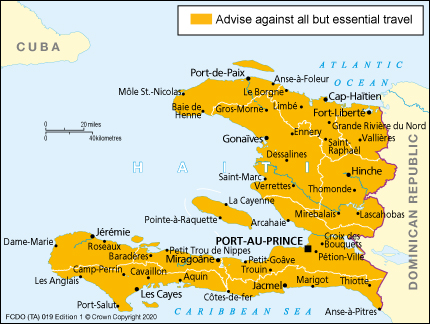Haiti
Summary

The Foreign, Commonwealth & Development Office (FCDO) advises against all but essential travel to Haiti due to the volatile security situation.
Before you travel, check the ‘Entry requirements’ section for Haiti’s current entry restrictions and requirements. These may change with little warning. Monitor this advice for the latest updates and stay in contact with your travel provider.
If you plan to pass through another country to return to the UK, check the travel advice for the country you’re transiting.
It is more important than ever to get travel insurance and check it provides sufficient cover. See the FCDO’s guidance on foreign travel insurance.
Since 12 September, roadblocks and barricades have disrupted major roads throughout the country, including Port-au-Prince accompanied by public demonstrations.
Demonstrations, protests and roadblocks can be unpredictable and sometimes violent. If you’re in Haiti, you should remain vigilant and informed at all times, keep movements to a minimum and regularly review your departure options. Avoid all demonstrations and large public gatherings, monitor local media, follow the advice of local authorities and keep up to date with this travel advice. The following local FM radio stations broadcast in French and Kreyol: Radio Metropole 100.1; RFM 104.9; Radio Kiskeya 88.5; Radio IBO 98.5; Radio ONE 90.5; Radio Nationale d’Haiti 105.3; and Radio Pacific 101.5.
The movement of goods and people into and within the country is often disrupted due to blocked roads and security incidents. As a consequence, there are sometimes fuel and food shortages. There are currently no UK diplomats in country.
There are currently severe fuel shortages throughout the country. This has impacted negatively on the provision of essential services throughout the country including communications, electricity, medical services and transportation. You should make sure you have all the supplies you might need for your stay.
There are currently no UK diplomats in country and Consular support is not available from the British Embassy in Haiti. If you are in Haiti and need help, you should contact the British Embassy in Santo Domingo, Dominican Republic. Our ability to offer consular support in Haiti from Santo Domingo is limited.
If you’re in Haiti, you should remain vigilant and informed at all times, keep movements to a minimum and regularly review your departure options. Avoid all demonstrations and large public gatherings, monitor local media, follow the advice of local authorities and keep up to date with this travel advice. The following local FM radio stations broadcast in French and Kreyol: Radio Metropole 100.1; RFM 104.9; Radio Kiskeya 88.5; Radio IBO 98.5; Radio ONE 90.5; Radio Nationale d’Haiti 105.3; and Radio Pacific 101.5.
The Atlantic hurricane season runs from June to November. You should monitor local and international weather updates from the US National Hurricane Center and follow the advice of local authorities, including any evacuation orders. See Natural disasters
The number of violent criminal incidents, including armed robbery and kidnapping, have increased since January 2021. You should take great care due to the risk of criminal activity throughout the country. See Crime
Curfews and new security regulations can be announced at short notice.
You should heed the advice of local authorities before attempting to reach areas off the main roads.
Take extra care if you’re travelling between Haiti and the Dominican Republic by road, as there are high levels of crime near the border in the Dominican Republic.
Although there’s no recent history of terrorism in Haiti, attacks cannot be ruled out. See Terrorism
There are no central emergency services in Haiti. Medical facilities are very limited and offer a poor standard of care. Serious conditions may require medical evacuation, which can be very expensive. See Health